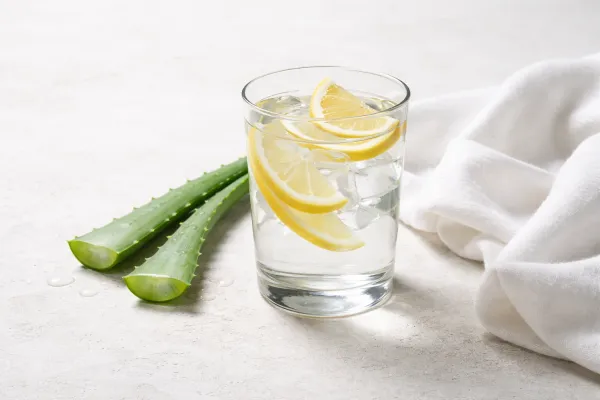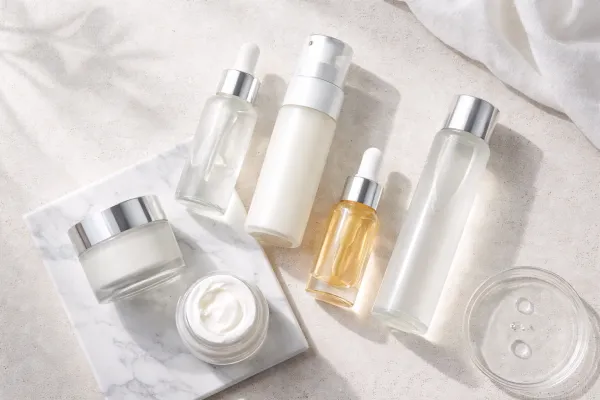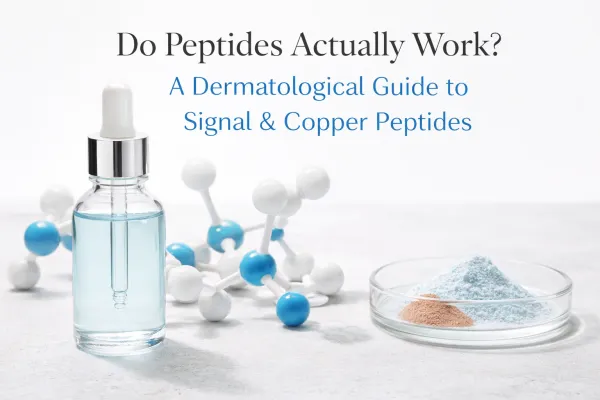7 Key Ways Alcohol Affects Your Skin & Actionable Steps to Improve It
Discover 7 key ways alcohol harms your skin, from dehydration & premature aging to redness & breakouts. Learn actionable steps to reverse damage & achieve a healthy, glowing complexion. Take control today!
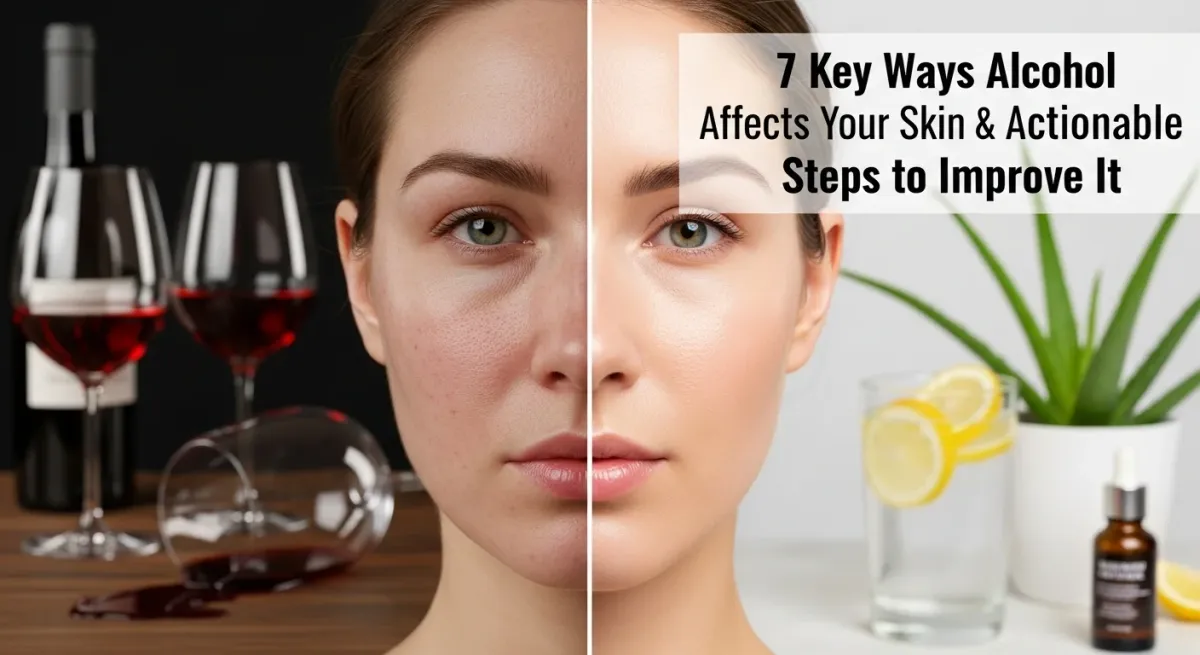
Your skin is a window. It shows how you live. Alcohol changes that window. It harms your skin in many ways. This guide shows you exactly how. You will learn simple steps to make your skin look better.
"How Alcohol Affects Your Skin" in a Nutshell
- Dehydration: Alcohol dries out your body. This includes your skin.
- Inflammation: It causes redness and swelling. This makes your skin look puffy.
- Nutrient Loss: Alcohol steals key vitamins and minerals. Your skin needs these to stay healthy.
- Faster Aging: It breaks down collagen. This leads to more wrinkles and sagging skin alcohol speeds up this process.
- Acne Issues: It can make breakouts worse. This affects your complexion.
Understanding the Core Mechanisms: How Alcohol Impacts Skin Health
Alcohol does more than just give you a hangover. It directly attacks your skin health. This happens deep inside your body. You might not see it right away. But its effects of booze on skin add up fast.
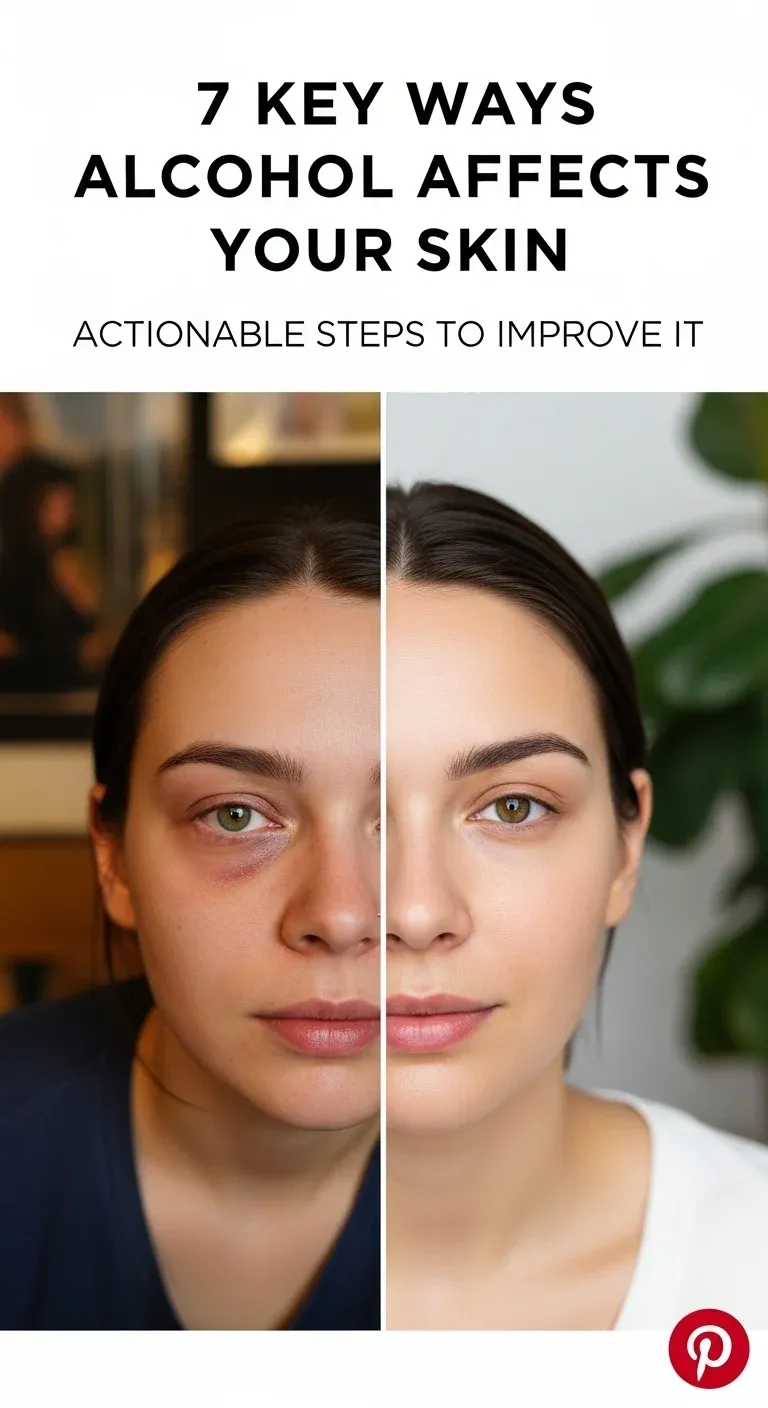
Think of your body like a garden. Alcohol is like a harsh weed killer. It doesn't just kill weeds. It damages the good plants too. Your skin suffers because of this.
Dehydration: The Primary Culprit
Alcohol is a diuretic. This means it makes you pee more. When you pee more, your body loses water. Your skin becomes dry. It can't hold moisture well. This leads to a dull, tired complexion.
Good hydration is key for healthy skin. When you drink alcohol, you work against it. This affects your skin barrier function.
Inflammation: Triggering Redness and Swelling
Alcohol causes inflammation throughout your body. Your skin is no different. It makes tiny blood vessels in your skin get bigger. This leads to a red face from alcohol causes a flushed look.
For some, this can trigger or worsen rosacea. This is a skin condition with redness and bumps. Inflammation also makes your face look puffy. Your eyes can look swollen, too.
Nutrient Depletion: Stealing Skin's Vitality
Drinking alcohol can stop your body from taking in important nutrients. Your liver works hard to process alcohol. This takes away from its other jobs. These jobs include helping your skin.
Alcohol also lowers levels of Vitamin A and antioxidants. These are vital for fresh, new skin cells. Without them, your skin cannot heal or protect itself. It's like trying to build a house without enough bricks.
Here's a quick look at how alcohol hits your skin:
| Alcohol Effect | Why It Happens | How to Counter It |
|---|---|---|
| Dehydration | Alcohol is a diuretic; you lose water | Drink water, use hydrating serums, moisturize often |
| Inflammation | Widens blood vessels, triggers body's immune response | Reduce intake, use soothing skincare, avoid triggers |
| Nutrient Depletion | Interferes with nutrient absorption, overworks liver | Eat nutrient-rich foods, consider supplements |
| Collagen Loss | Creates harmful free radicals, slows repair | Eat collagen-boosting foods, use retinoids |
The 7 Key Ways Alcohol Manifests on Your Skin
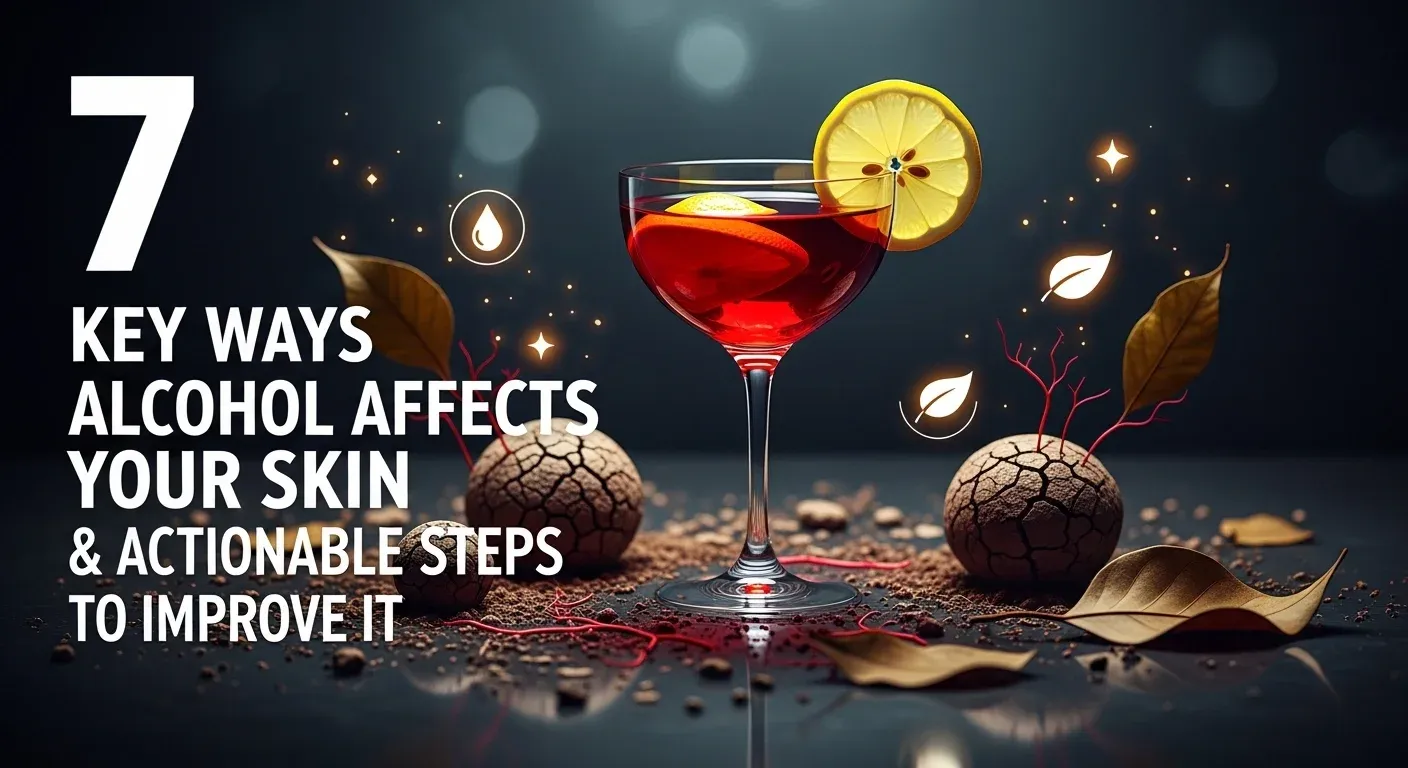
You might think alcohol skin effects are just a flushed face. But the truth is, drinking and skin health are deeply linked.
Alcohol shows up on your skin in distinct ways. These are clear signs of its impact.
This is how alcohol damages skin over time. Paying attention to these signs can help you make better choices for your skin. It helps you see why does my skin look bad after drinking.
1. Increased Redness and Rosacea Flares
Alcohol makes your blood vessels expand. This brings more blood to the surface of your skin. It causes an instant red face from alcohol. If you have rosacea, alcohol can make it much worse.
Flushes become more frequent and intense. This can even lead to permanent redness or visible blood vessels. According to a study, even moderate drinking can worsen rosacea.
2. Premature Aging: Wrinkles and Loss of Elasticity
Alcohol breaks down collagen. This is the protein that keeps your skin firm. It also reduces elasticity. This makes your skin less bouncy.
The result?
Wrinkles appear faster. Fine lines become deeper. Your skin can start to look old before its time. People often wonder, "does alcohol make you look older?" The answer is yes.
3. Puffy Face and Swollen Eyes
Remember dehydration and inflammation? They team up to make your face swell. Your body holds onto water in odd places.
This is a common puffy face alcohol treatment need. This leads to a puffy, bloated look. Especially around your eyes. Those swollen eyes give away your late night.
4. Dry, Dull, and Flaky Complexion
Alcohol sucks the moisture right out of your skin. Your skin becomes dry. It can even feel tight and rough.
You might notice flaky patches. This dulls your complexion. It loses its natural glow. Your skin just looks tired and lifeless. This is a direct sign of alcohol's impact on complexion.
5. Acne Breakouts and Worsened Skin Conditions
Alcohol can trigger acne breakouts. It can mess with your hormones. This causes more oil production. Plus, the sugar in many alcoholic drinks is bad for your skin. It can fuel inflammation.
Existing skin problems from alcohol like eczema or psoriasis also tend to get worse. This creates an alcohol and acne connection.
For more on diet's effect, see how diet affects teenage skin.
6. Dark Circles Under Eyes
Lack of good sleep often comes with drinking. This makes dark circles more visible. Alcohol also dilates blood vessels around your eyes. This makes the area look darker and more hollow. It’s a double whammy for tired-looking eyes.
7. Compromised Skin Barrier Function
Your skin barrier is your first line of defense. Alcohol can weaken it. A weak barrier lets moisture out easily. It also lets bad stuff in.
This means more dryness. It also leads to more sensitivity and irritation. This causes more alcoholic skin changes.
You need to restore your skin barrier to protect your skin.
Immediate and Long-Term Strategies to Counter Alcohol's Effects
You don't have to live with the negative alcohol skin effects. There are clear steps you can take. These strategies will help reduce alcohol skin damage. They will also bring your skin back to health.
Start today.
Here's how you can take control:
Prioritize Hydration: Water and Electrolytes
This is number one. Drink plenty of water throughout the day. It helps counter the dehydrating effects of alcohol.
Add electrolytes to your water, especially after drinking. This helps your body hold onto fluid better.
- Drink a glass of water for every alcoholic drink.
- Keep a water bottle with you always.
- Eat water-rich foods like fruits and vegetables.
Optimize Your Skincare Routine
Your skin needs extra care when fighting alcohol damage. Focus on gentle, hydrating products. Products with ceramides or hyaluronic acid help a lot. They restore moisture. Choose a good moisturizer.
Find one that helps with skin barrier repair.
- Cleanse gently: Use a mild cleanser to remove dirt without stripping skin.
- Hydrate deeply: Apply serums with hyaluronic acid.
- Moisturize generously: Lock in moisture with a rich cream.
- Protect daily: Always use sunscreen. Alcohol can make your skin more sensitive to sun damage.
Boost Nutrient Intake with Diet and Supplements
Your diet plays a huge role in how to reverse alcohol skin damage. Eat foods rich in antioxidants. These fight damage caused by alcohol. Think berries, green leafy vegetables, and colorful fruits.
These foods support your skin from the inside out. They help your body get the Vitamin A it needs.
- Eat more greens, nuts, and seeds.
- Include healthy fats like avocado.
- Consider a multivitamin. Ask a doctor or Dermatologist first.
Making Sustainable Changes: Reducing Alcohol's Impact
Changing habits takes time. But the benefits for your skin are huge. Think about your long-term skin health. Small, consistent steps lead to big improvements. You can make your complexion glow again.
Mindful Drinking Practices
You don't always have to quit completely. But you can drink smarter. This means being aware of how much you drink.
It also means understanding what you drink. Clear spirits like gin or vodka often have fewer added sugars than sugary cocktails. Sugary drinks are worse for breakouts.
- Set limits before you start drinking.
- Alternate alcoholic drinks with water.
- Choose drinks with less sugar.
- Take breaks from alcohol, like Dry January. This helps with alcohol detox for skin. The NHS suggests limiting weekly alcohol intake drinkaware.co.uk.
Seeking Professional Guidance
If you're struggling to reduce alcohol skin damage, get help. A Dermatologist can offer personalized advice. They might suggest specific treatments.
Or they can recommend products for your skin problems from alcohol. Your general doctor can also offer support for cutting down. Don't be afraid to ask. They are there to help you.
Lifestyle Adjustments for Skin Recovery
Beyond drinking less, other healthy habits boost skin recovery.
Sleep is a big one. It allows your skin to repair itself. Exercise improves circulation.
This brings fresh oxygen and nutrients to your skin. Also, manage stress. Stress can worsen many skin issues.
- Get 7-9 hours of sleep each night.
- Exercise regularly to boost blood flow.
- Practice stress-reducing activities.
- Eat a balanced diet, focusing on foods that support clear skin. Read more about foods to avoid for clear skin.
From the Field: A Personal Note
After over a decade in this field, one thing became clear to me.
Many people think their skin issues are just bad luck. Or that it's just aging. But often, the problem ties back to daily habits.
I remember one client, Sarah. She came in with constant redness. She had dull, tired skin. She always said, "I just have sensitive skin."
We talked about her diet and lifestyle. She drank wine every night. Not a lot, just a glass or two. She didn't see it as a big deal. I showed her how alcohol affects her blood vessels. We talked about the hydration loss.
We also discussed how it steals her antioxidants. She felt a light bulb go off. She didn't have to quit completely. She just cut back. She drank water between glasses. She focused on hydrating skincare.
Within a month, her skin had a fresh glow. The redness calmed down. It wasn't magic. It was simply understanding how alcohol affects your skin. Then she took action.
Conclusion & Next Steps
Alcohol clearly harms your skin. It causes dehydration, inflammation, and speeds up aging.
You now know the 7 Key Ways Alcohol Affects Your Skin. You also have clear steps to take.
Start by focusing on hydration and a smarter skincare routine. Make mindful choices about drinking. Your skin will thank you. Take action today.
FAQ
Can quitting alcohol improve my skin quickly?
Yes, many people see fast changes. Your skin can look more hydrated in days. Redness may lessen in a few weeks. Collagen rebuilds over months. The biggest improvements happen with consistent effort. Your body needs time to heal. When you stop drinking alcohol, your body begins to recover almost immediately. Improved sleep quality, better hydration, and reduced inflammation all contribute to a healthier complexion. Your skin cells renew constantly, and without the dehydrating effects of alcohol, you'll notice a difference in your skin's appearance and texture.
What should I drink instead of alcohol for better skin?
Focus on water. Add lemon or cucumber for flavor. Herbal teas are great. Green tea has antioxidants that help your skin. Sparkling water with fruit can feel like a treat. These choices boost hydration without the negative effects. Proper hydration is essential for maintaining skin elasticity and preventing dryness. Water helps flush toxins from your body and supports the skin's natural healing processes. Green tea, in particular, contains polyphenols that can help reduce inflammation and protect against UV damage.
Does all alcohol affect my skin the same way?
Not exactly. Sugary drinks like cocktails can be worse for breakouts. Red wine can cause more rosacea flares for some people. Clear spirits might be less harmful. But all alcohol is still a diuretic. It still causes dehydration. Different types of alcohol can trigger various skin reactions. Cocktails and sweet wines contain high amounts of sugar, which can feed acne-causing bacteria. Red wine contains histamines and tannins that can cause flushing and worsen conditions like rosacea. While some alcohols may be less inflammatory than others, they all contribute to dehydration, which negatively impacts skin health.
How does alcohol cause dark circles under my eyes?
Alcohol disrupts sleep. Poor sleep makes dark circles stand out. It also expands blood vessels under the thin skin around your eyes. This makes the area look darker. Staying hydrated helps, but good sleep is key. The skin under your eyes is among the thinnest on your body, making it particularly susceptible to showing signs of fatigue and dehydration. Alcohol interferes with your sleep cycle and causes vasodilation, which can lead to the pooling of blood under your eyes. This, combined with the dehydrating effects of alcohol, makes dark circles more prominent and gives your skin a tired appearance.
Can my skin recover from years of heavy drinking?
Yes, skin is amazing at healing. How to reverse alcohol skin damage means being consistent. Quitting or reducing alcohol helps immensely. Hydration, good skincare, and a healthy diet make a big difference. Many see significant recovery, even after years. The skin has a remarkable ability to regenerate and repair itself. When you reduce or eliminate alcohol consumption, improve your hydration, eat a nutrient-rich diet, and follow a consistent skincare routine, your skin can begin to recover its health and vitality. While some damage may be permanent, many people experience noticeable improvements in skin texture, tone, and overall appearance with sustained healthy habits.

